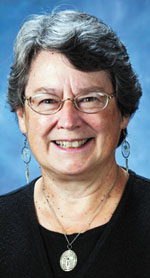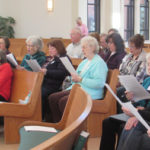By Corrine Winter
President Obama’s historic visit to Hiroshima this week has been the subject of much debate. News commentators made a great deal of the fact that he wouldn’t and didn’t apologize for the bombing of that city during World War II. Apparently, some had feared that he might do so.

Now the gist of many commentaries seemed to be that an apology would raise still sensitive issues regarding the justification of the bombing. But that is not the issue I want to address, partly because it deserves to be and has been addressed in much longer and more detailed reflections. The comments that stuck in my mind were those that seemed to paint any kind of apology as an indication of weakness. Is a nation an institution or an individual who apologizes in some sense acknowledging defeat? Does one apologize only to a better or more powerful entity?
In this year of mercy, Pope Francis tells us that the opposite is true. He calls us to recognize humility as a virtue of the strong, to find the power. We learn to show mercy to others by recognizing that we are sinners forgiven by God. That recognition opens us to a strength beyond our own, allowing us both to forgive others even what might appear in some lights to be “unforgivable,” and to pursue the goal of loving as we are called to love even after we fail multiple times in the attempt. When we grasp the generosity of God’s mercy, we find hope to face seemingly insurmountable odds as we seek to build a world in which justice for all prevails.
It is, of course, possible to go to extremes in understanding ourselves as sinners. One who develops scruples over every act or its motivation as potentially sinful is likely to become utterly distracted by self-examination. In that state, it is difficult to trust in God’s mercy as it appears ineffectual. Such false humility is as great a barrier as is arrogance to the communion with God and others that is the content of our vocation as human.
Created in the image of the Triune God, we are called to a life of mutual love that recognizes the dignity and value of each person and community of persons and thus reaches out to others as equals. By our God-given nature, we know at the deepest level that we need and are needed by one another. Therefore, we long for right relationships. We desire to heal rifts, to share our gifts with others and to delight in their contributions to the common good. The extent to which that might sound like an overly-idealized view of humanity bears witness to our common need for the mercy and grace of God.
The capacity of humanity to live as God created and calls us to live is revealed in the mystery of the Incarnation. Taking on our humanity, the Son shows us that we are made to share in God’s own life. We are further strengthened by the continuous work of the Holy Spirit among us, as the recent feast of Pentecost called to mind representing the power of the Spirit through images of fire and wind.
We are creatures and thus not perfect. But we are also loved by the Creator who makes us out of God’s own goodness to show forth that goodness by our lives. In order to fulfill that mission, we must acknowledge the full truth about who we are. That includes knowing that not all of our choices and actions are right. It includes apologizing and asking for forgiveness as well as forgiving others. It includes as well, regretting unintended consequences of our actions. We can do those things precisely because we know our own worth and not because we doubt it.
(Corinne Winter is a professor of theology at St. Ambrose University in Davenport.)











